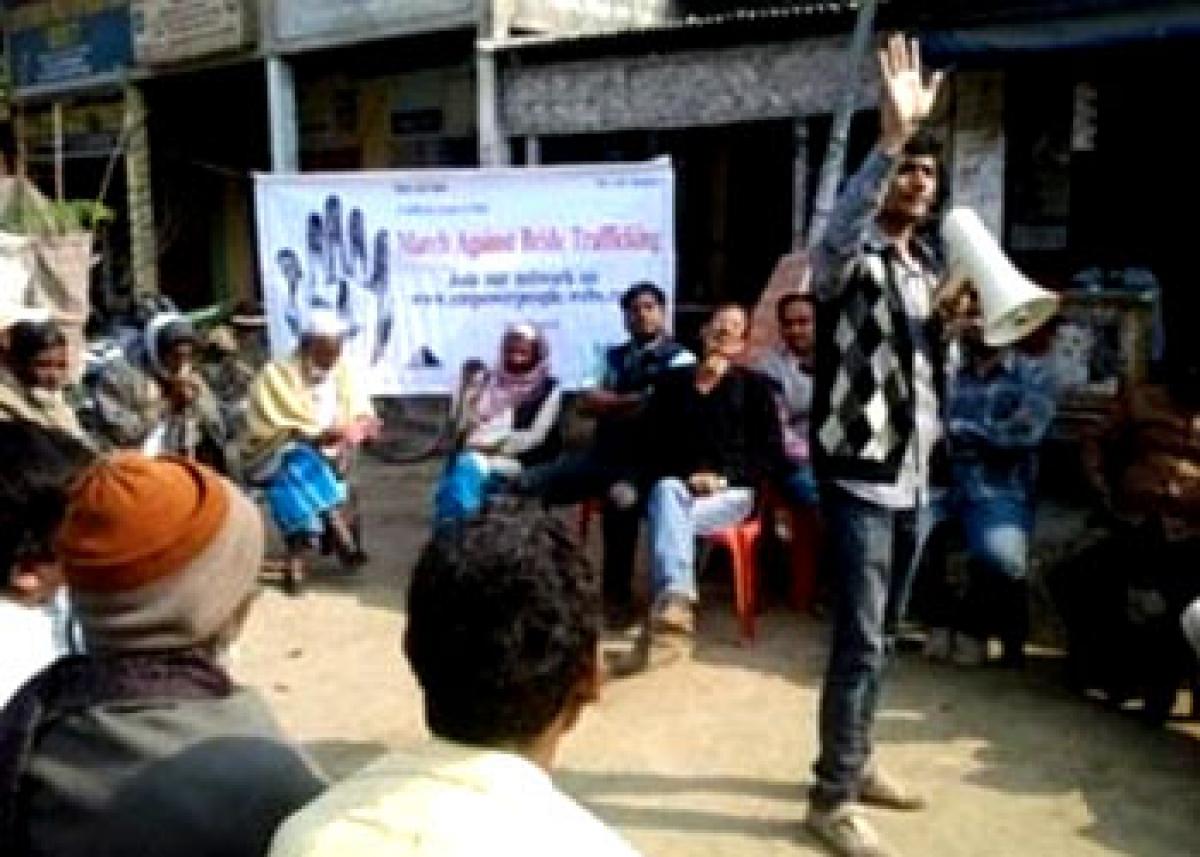Live
- NASA Tracks Five Giant Asteroids on Close Approach to Earth Today
- Pushpa 2 Hits ₹1000 Crore in 6 Days: How It Compares to Other Top Indian Films
- Vivo X200 and X200 Pro Launched in India: Price, Specifications, and Features
- Nitin Gadkari Admits Feeling Embarrassed at Global Summits Over Rising Road Accidents in India
- Opposition Slams ‘One Nation, One Election’ Bill as Anti-Democratic; BJP Allies Support the Move
- Celebrate Karthigai Maha Deepam Virtually with Sri Mandir’s LIVE Darshan Experience
- BJP Extends Support to Samagra Shiksha Abhiyan Employees' Strike, Demands Immediate Regularization and Welfare Benefits
- Dr. M. Priyanka Stresses Quality Education, Nutritious Meals, and Cleanliness in Schools
- Mandal Level CM Cup Sports Concludes in Ija with Promising Talent and Enthusiastic Participation
- Harish Rao Slams Revanth Reddy: "More Talk, Less Action"
Just In

Zahida is overcome with sorrow as she recalls with a sense of bitterness, how she was taken far away from her home in Assam, forced into a life of extreme humiliation and loss of dignity.
Guwahati : Zahida is overcome with sorrow as she recalls with a sense of bitterness, how she was taken far away from her home in Assam, forced into a life of extreme humiliation and loss of dignity.
"My own brother married me off for a paltry sum of Rs. 2,000 to Khursheed from a village in Haryana!" laments the 40-year-old woman.
There are hundreds of women driven by desperate circumstances, who find themselves caught in a web of promised marriages in areas far from their own villages, mostly outside their state. The marriage, however, is only a cover up for an ugly truth - of bride trade or bride trafficking.
The 'marriage' is nothing short of being 'sold' to a man for a sum of money, a transaction that often involves the immediate family members or relatives of the woman, as in Zahida's case.
Bride trade is akin to trafficking for sex. Girls and women are 'sourced 'as 'brides' from states including Assam, Bihar, Jharkhand, West Bengal, Andhra Pradesh, Telangana and Maharashtra. They are then brought to Haryana, Punjab and other 'destination' states to be 'married' -- rather to be 'sold'-- as brides and then treated as a sex object, domestic worker and literally a slave.
According to Shafique ur Rahman Khan, Founder and Executive Director, Empower People, a Haryana-based NGO focusing on rescue of victims of bride trafficking and honour crimes against women, "Each time, a woman is 'sold' as a bride she is required to fulfill all the duties of a 'wife' without being given either the rights and privileges of a married woman," says Khan, the majority of these women have no voice in household matters and are not allowed to attend festivals. Several women do not even figure on the Electoral Roll.
The organisation which began its work in 2006, works not only with victims of trafficking but focuses equally on those who are vulnerable to being trafficked. The emphasis is on the creation of supportive networks and this has led to active engagement with religious/ethnic leaders, community members and other stakeholders.
A study conducted by Empower People in 2012-13 showed that amongst the women, trafficked majority (79%) were from Muslim families. 17% were from ST and 4% from the SC community. The study also showed that even if a woman exits the network, she is liable to be trafficked again.
56% women have been trafficked twice, 21% women have been trafficked three times and 6% women more than thrice. The team at Empower People, understood that there have to be safeguards to prevent a relapse into trafficking.
A powerful safeguard is to secure their identity proof. Without this, they remain nameless, faceless and without any official identity and even if they have been rescued once but once again find themselves in vulnerable circumstances that drag them back into the trade.
The organization stresses on establishing the identity of trafficked brides by registering them in the Electoral Roll or enabling them to get a ration card. In Zahida's case she went from one set of vulnerable circumstances to another. After her husband Khursheed passed away, her position became even worse and she once again, she became a target for bride trading networks.
It was at the point that Empower People intervened and facilitated the process of getting an identity proof. They gave her information on the legal aspects of her situation and then inducted her into a vocational training programme to enable to learn a skill, earn a living, and live a life of dignity. Most important -this enabled Zahida to find a permanent exit from bride trade. This has been truly liberating.
Trafficking is a reflection of extreme vulnerability of women and girls, especially from marginalised communities and is indeed a horrifying aspect of an unequal society that treats women as 'commodities'.
At the root surely lies the entrenched, deep-rooted gender discrimination that virtually begins in the womb and continues to dog girls as they grow into adulthood. It denies them the equal access to key areas for their development -nutrition, health and education and further leaves them bereft of skills or resources to realize their full potential as adults.
The Charkha Development Communication Network feels that by addressing the mammoth issue of trafficking in a small way, Empower People is enabling hundreds of women such as Zahida to find their way back from its grip to a more secure, safer, dignified existence that was their right in the first place.
The views expressed in the article are that of Anis ur Rahman Khan.

© 2024 Hyderabad Media House Limited/The Hans India. All rights reserved. Powered by hocalwire.com







